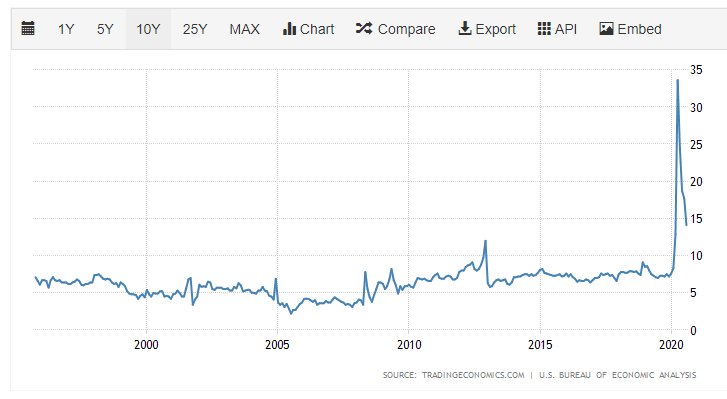I hope you are staying safe and healthy.
On Thursday, October 22nd at 12:30, I will host my next “Ask Me Anything” webinar. The primary topic: “Crazy, Low, Interest Rates: What Should You Do Next?” Check your inbox next week for additional information.
Deciding how much to spend, how much to save, and what to save it for can require a delicate balance. It starts with everyday living expenses, including food and shelter. If you work hard, you deserve at least the occasional vacation. If you have kids, you may want to save for their college education. You can’t forget retirement savings either. Can we save too much? What are the consequences if we do? Check out the last of this week’s articles for some thoughts on what can happen.
The market’s performance over the last represents a microcosm of what we’ve seen over the last six weeks. We saw strong gains on Friday and Monday. Early on, Tuesday looked good as well. Then fears that there would not be additional government stimulus before the elections caused the market to do an about-face. After a small decline on Thursday, the S&P 500 Index ended the last five trading days about 1% higher. So far in October, the S&P 500 is up 3.6%. It is 7.8% higher year-to-date.
We still face considerable uncertainty around the upcoming elections, the economy, and the pandemic. This afternoon a friend shared the following chart showing the Household Savings Rate over the last 25 years:

The combination of the stimulus payments and the stay-at-home orders likely drove the upward spike in April. Personal savings remain well above the average over the last 25 years. It looks like consumers remain uncertain about the current environment as well. I continue to expect the market to remain volatile over the short term. Investors should stay focused on the long term. I recommend having a plan and process in place and sticking to them. If you have a financial plan and a suggested allocation, I recommend sticking to them. If you don’t and would like some help, please schedule a free call.
Here are the links to this week’s articles as well as a brief description of each:
1. Can You Save Too Much in a Health Savings Account? Many people overlook the value of health savings accounts (HSAs). You can accumulate savings in an HSA that are triple tax-free. They are more tax-efficient than 401k’s/IRA’s and Roth IRA’s. Contributions to an HSA are not subject to tax. HSAs can also provide tax-free growth. If you follow the rules, you can withdraw money from your HSA tax-free, too. Can your HSA grow too large? Probably not. This article shares the primary ways to get money out of your account. If you’re not familiar with HSAs, you can also read this blog. If you still have questions about how HSAs work, please give me a call.
2. Take Ownership of Your Future Self. When asked if they are the same person today that they were 10 years ago, most people say no. When asked about the future, we see less potential for change. Many of us share this behavioral bias. Our personalities, skills, likes, and dislikes change over time. Change is inevitable. Fortunately, you can control it to some extent. The article shares three strategies we can use to become our desired future selves:
a) Distinguish your former, current, and future selves
b) Imagine your desired future self
c) Change your identity narrative
The second is a personal favorite. I rely on it often as I continue to grow and develop my business. I believe it helps.
3. Coming Into Focus. In his latest memo, Oaktree Capital’s Howard Marks shares his latest thoughts about the economy and the market. The article focuses on the unusual characteristics of this year’s economy. Usually, economic weakness causes downturns. The pandemic caused the current downturn. This means the recession was a result rather than a cause. The memo also addresses the low interest-rate environment and strategic alternatives for investors.
4. 9 Reasons Why Making Assumptions is Dangerous. Growing up I watched re-runs of the Odd Couple all the time. In one of my favorite scenes, Felix (Tony Randall) and Oscar (Jack Klugman) were in court after being arrested for allegedly trying to scalp theater tickets. Rather than hire a lawyer, Felix represents himself. One of my favorite scenes comes when he explains to the woman who thought he was trying to sell her the tickets illegally. He tells her what happens when you assume. (If you’re not familiar, check this link.) This article’s author shares a similar sentiment. He explains why you should avoid making assumptions. It’s hard to argue with any of his points. If you start asking questions and stop making assumptions, you will likely be much happier, too.
5. Am I Saving Too Much for Retirement? Can you save too much for retirement? Believe it or not, if you save diligently, you may achieve your savings goals before reaching your retirement date. Saving too much is not necessarily a bad thing. A financial plan can help you understand where you stand currently. It can also help you determine how much of your income you should save. Here are some signs you may be saving too much for retirement:
· You’re unable to cover basic living expenses.
· You have too much debt.
· You have no financial plan.
· You have excess funds.
· You bypass meaningful opportunities.
If you do not have a financial plan and would like help putting one together, please schedule a free Strategy Session.
Our practice continues to benefit from referrals from our clients and friends. Thank you for your trust and confidence.
We hope you find the above posts valuable. If you would like to talk to us about financial topics including your investments, creating a financial plan, saving for college, or saving for retirement, please complete our contact form. We will be in touch. We can schedule a call or a virtual meeting via Apprise Wealth Management’s Zoom account.
Follow us:
Please note. We post information about articles we think can help you make better money-related decisions on LinkedIn, Facebook, and Twitter.
For firm disclosures, see here: https://apprisewealth.com/disclosures/




